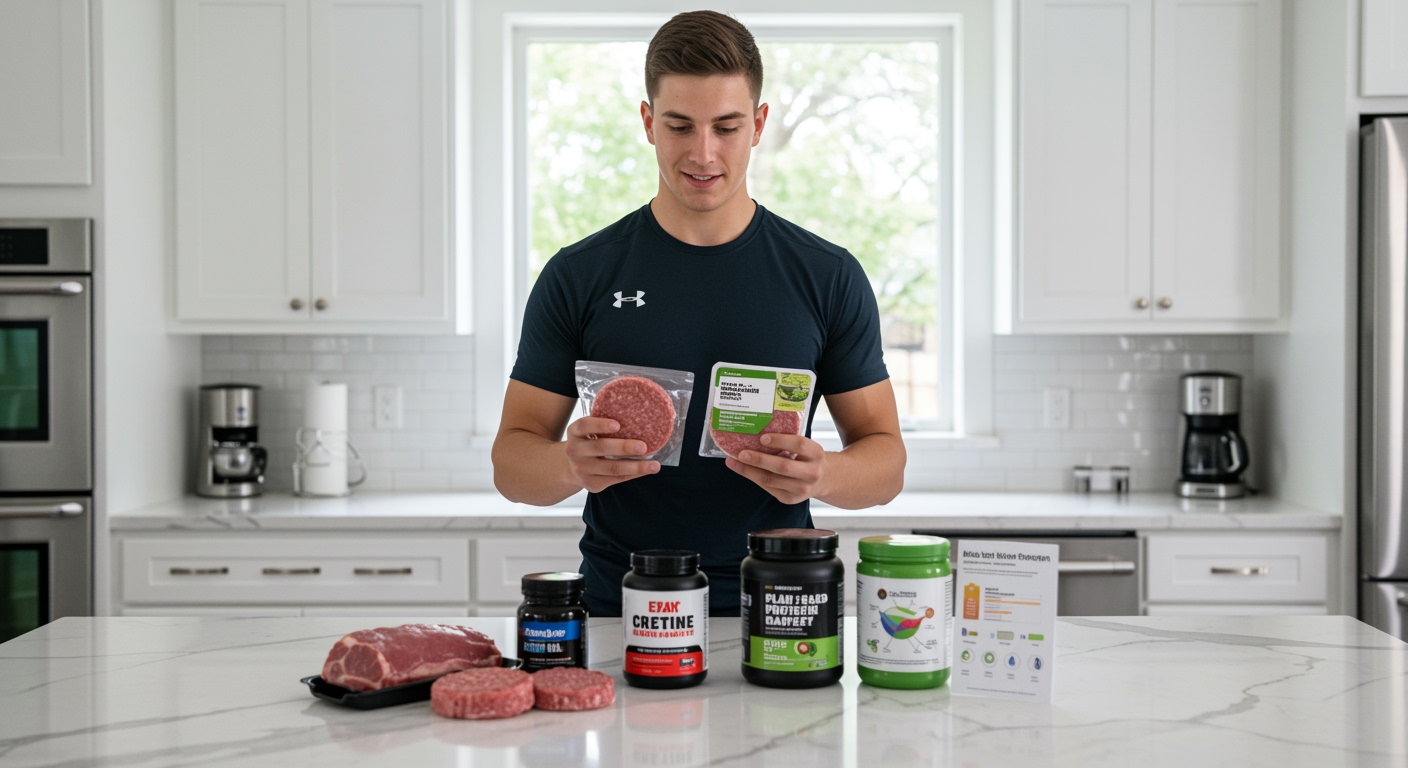✪ Key Highlight: Texas A&M study reveals pork meals helped military cadets recover faster with 50% better mood scores than plant-based options.
Introduction
Military training pushes the human body to its absolute limits every single day.
A groundbreaking study from Texas A&M University just revealed that the type of protein soldiers eat after intense training makes a dramatic difference in how quickly they recover and how good they feel.
Hi, I’m Abdur, your nutrition coach and today I’m going to analyze this fascinating research that shows why pork meals helped military cadets bounce back faster than plant-based alternatives.
What Did This Military Study Actually Test?
Researchers designed this study to answer one critical question about military nutrition.
They wanted to know if the protein source in military meals affects how soldiers recover from the Army Combat Fitness Test.
The study used a double-blind crossover design, which means cadets ate both pork-based and plant-based meals at different times without knowing which was which.
Each meal contained exactly the same calories and macronutrients.
The only difference was whether the protein came from lean pork or plant sources.
This setup allowed researchers to isolate the impact of protein type on recovery and mood.
Cadets followed strict protocols including 48 hours of rest before testing, blood and urine sampling, and three days of monitored recovery.
✪ Fact: Only one of the 14 current U.S. military MRE menus features pork as the main protein source.
How Did Pork Meals Change Recovery Markers?
The results showed clear biological advantages for cadets eating pork meals.
Cadets had significantly lower cortisol levels after eating pork compared to plant-based meals.
Cortisol is your body’s main stress hormone that breaks down muscle tissue when elevated for too long.
The pork group also showed higher testosterone-to-cortisol ratios, indicating a more anabolic state.
An anabolic state means your body is primed for muscle building and repair rather than breakdown.
Researchers measured inflammatory markers like interleukin-8 and found less inflammation in the pork group.
Lower inflammation speeds recovery and reduces the risk of overtraining syndrome that plagues many athletes.
✪ Pro Tip: Monitor your recovery by tracking sleep quality and muscle soreness patterns after different protein sources.
Why Did Muscle Soreness Drop With Pork?
Muscle soreness tells us a lot about how well your body is recovering from intense exercise.
Cadets eating pork meals reported significantly less thigh soreness after the Army Combat Fitness Test.
The study also measured urinary nitrogen losses, which indicate how much muscle protein your body is breaking down.
Lower nitrogen losses in the pork group meant their bodies were preserving more muscle tissue.
This preservation happens because pork contains all essential amino acids in optimal ratios for human muscle protein synthesis.
Plant proteins often lack one or more essential amino acids, forcing your body to break down existing muscle to get what it needs.
The creatine content in pork also plays a crucial role in muscle energy production and recovery speed.
✪ Note: Most people, especially vegetarians and vegans, do not get enough creatine from their diets alone.
What Happened To Mood And Sleep Quality?
The psychological benefits of pork meals were just as impressive as the physical ones.
Cadets reported significantly better sleep quality when eating pork-based meals.
Quality sleep is essential for muscle recovery, hormone regulation, and cognitive performance in high-stress environments.
Mood scores improved dramatically, with depression assessments dropping by over 50 percent within just 48 hours.
This rapid mood improvement likely stems from better amino acid availability for neurotransmitter production.
Your brain needs specific amino acids to make serotonin, dopamine, and other chemicals that regulate mood and motivation.
Appetite satisfaction also increased with pork meals, helping cadets stick to their nutrition plans during demanding training periods.
✪ Fact: Protein quality directly affects neurotransmitter production, which influences mood, focus, and sleep patterns.
Should Military Meals Change Based On These Findings?
The research team believes these findings have serious implications for military nutrition policy.
Dr. Richard Kreider, a study leader with decades of sports nutrition experience, expressed concern about plant-based MREs meeting soldiers’ needs.
He emphasized that military personnel performing at peak levels need adequate essential amino acids and creatine in their diets.
The study suggests two potential solutions for improving military nutrition.
First, add more pork-based options to the current MRE menu system.
Second, fortify plant-based meals with creatine and essential amino acids to match the benefits of animal protein.
This research challenges the assumption that all proteins are equal when it comes to tactical athlete performance and recovery.
✪ Pro Tip: If you follow a plant-based diet, consider creatine supplementation to match the recovery benefits of animal protein.
The Bottom Line
This Texas A&M study proves that protein quality matters just as much as protein quantity for recovery and performance.
Your body responds differently to different protein sources, and choosing high-quality options like lean pork can dramatically improve how you feel and perform after intense training.
What are your thoughts on this research, and have you noticed differences in recovery based on your protein choices? Share your experiences in the comments below.
References
At NutritionCrown, we use quality and credible sources to ensure our content is accurate and trustworthy. Below are the sources referenced in creating this article:
- News Medical: Clinical trial finds pork meals enhance recovery and mood in military cadets
- ScienMag: Pork protein enhances recovery, mood and reduces inflammation in military cadets after combat fitness test
- Texas A&M University: Eating animal protein following training can improve recovery, study finds
- PubMed: Research study on pork protein and military recovery
- PMC: Full research article on pork meals and military cadet recovery





